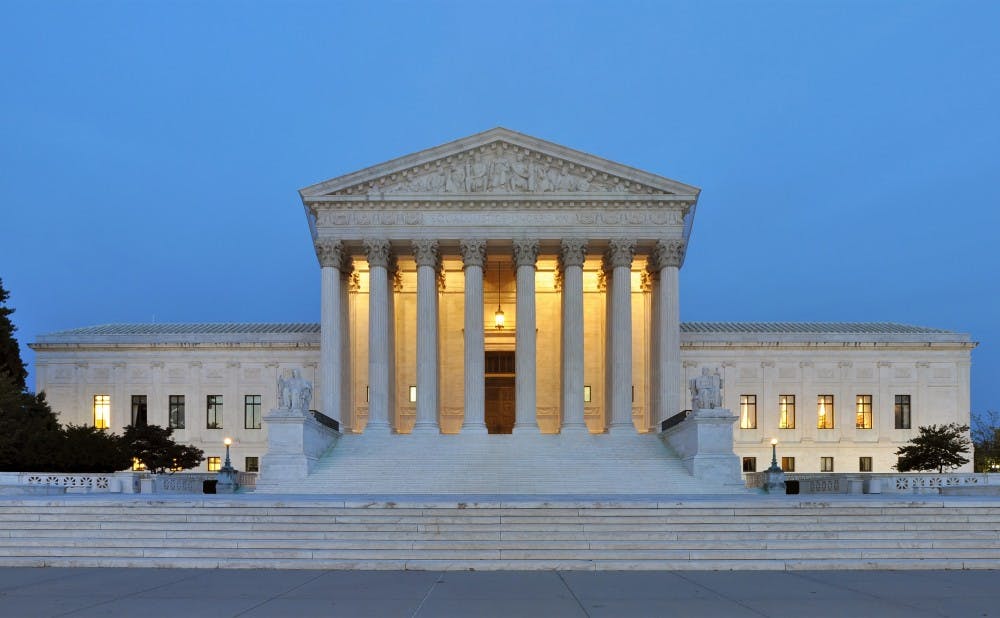The Supreme Court heard oral arguments Monday for two cases against Harvard University and the University of North Carolina at Chapel Hill that will decide the future of race-based affirmative action in higher education.
After five hours of arguments and questioning across two cases brought by anti-affirmative action nonprofit Students for Fair Admissions, the Supreme Court’s conservative bloc seemed ready to overturn years of precedent that allowed for the consideration of race as a means of increasing educational diversity.
SFFA claims that such policies are discriminatory against Asian American applicants. The group has retained Duke Professor of Economics Peter Arcidiacono as an expert and uses his research as a basis for its case.
Arcidiacono has studied Harvard and UNC admissions practices using data made public during these cases, and concludes that Black students with similar qualifications and backgrounds have a significantly higher acceptance rate to these schools than white students.
A major facet of SFFA’s case focuses on the lower “personal rating” that Asian American applicants to Harvard receive, implying that Harvard admissions officers purposely give these students lower ratings.
“Harvard ranks Asians less likable, confident and kind, even though alumni who actually meet them disagree,” said SFFA attorney Cameron Norris in oral argument, referring to the discrepancy that Arcidiacono found between the ratings that Harvard admissions officers gave Asian American applicants and ratings that Harvard alumni interviewers gave.
Arcidiacono, in an interview with The Chronicle in January when the Supreme Court made the decision to hear the case, said that Harvard had no justification for why the scores between different racial groups were different.
“In all of Harvard’s arguments, they could never explain why Asian Americans got significantly lower personal ratings,” Arcidiacono said.
During oral argument, Seth Waxman, the attorney representing Harvard, called the discrepancy between Asian Americans and other groups “slight.” He said that Arcidiacono’s research couldn’t model the various factors that go into the personal rating.
Waxman added that possible explanations might include differences in guidance counselor and teacher letters of recommendation. According to Waxman, Harvard admissions officers give each application a numerical personal rating score upon a first read of the application.
Conservative justices weren’t convinced by Waxman’s explanation.
“It has to be one of two things. It has to be that they really do lack integrity, courage, kindness and empathy to the same degree as students of other races, or there has to be something wrong with this personal score,” said Justice Samuel Alito.
“Putting aside the teacher recommendations or guidance counselor recommendations … I still haven't heard any explanation for the disparity between the personal scores that are given to Asians,” he added. “They rank below whites. They rank way below Hispanics and really way below African Americans.”
Justices also asked about how race might directly tip the scales in favor of one applicant over another given certain characteristics. Chief Justice John Roberts asked Waxman whether two hypothetical Black students with similar objective credentials, but different political or social viewpoints, would both receive a “tip” for being Black.
“For applicants who are essentially so strong on multiple dimensions, so extraordinarily strong on multiple dimensions that they are sort of on the bubble … being African American or being Hispanic or, in some instances, being Asian American can provide one of many, many tips that will put you in,” Waxman said.
“Race for some highly qualified applicants can be the determinative factor, just as being an oboe player in a year in which the Harvard-Radcliffe orchestra needs an oboe player will be the tip,” Waxman added, noting that racial preferences are “very close to zero.”
“Well, so there’s only a little racial discrimination in the case,” Roberts responded.
Arcidiacono’s research, however, claims that the impact of racial factors is more than “very close to zero.”
His research compared bumps in racial preference in Black and Hispanic applicants with those of white and Asian American applicants, and found that “affirmative action leads African American and Hispanic applicants to be significantly more likely to be admitted relative to their observationally equivalent white and Asian American peers.”
“You definitely see large bumps for Black applicants, large bumps for Hispanic applicants that are smaller than the bumps you get for Black applicants,” Arcidiacono told The Chronicle in January.
“Harvard would never say it this way, but you could say, it’s not that we’re penalizing Asian Americans, we’re just giving a bump to white students,” he added.
The Supreme Court is likely to release its decision in June of 2023.
Get The Chronicle straight to your inbox
Signup for our weekly newsletter. Cancel at any time.

Adway S. Wadekar is a Trinity junior and former news editor of The Chronicle's 119th volume.

